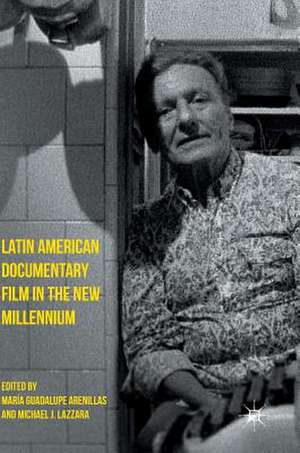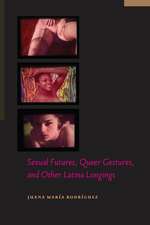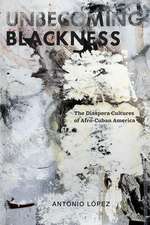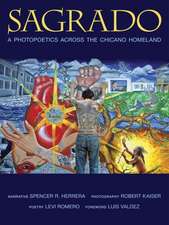Latin American Documentary Film in the New Millennium
Editat de María Guadalupe Arenillas, Michael J. Lazzaraen Limba Engleză Hardback – 8 iul 2016
Preț: 784.79 lei
Preț vechi: 957.06 lei
-18% Nou
Puncte Express: 1177
Preț estimativ în valută:
150.17€ • 163.63$ • 126.54£
150.17€ • 163.63$ • 126.54£
Carte tipărită la comandă
Livrare economică 23 aprilie-07 mai
Preluare comenzi: 021 569.72.76
Specificații
ISBN-13: 9781137495228
ISBN-10: 1137495227
Pagini: 298
Ilustrații: XVII, 302 p. 18 illus., 14 illus. in color.
Dimensiuni: 148 x 210 x 22 mm
Greutate: 0.52 kg
Ediția:1st ed. 2016
Editura: Palgrave Macmillan US
Colecția Palgrave Macmillan
Locul publicării:New York, United States
ISBN-10: 1137495227
Pagini: 298
Ilustrații: XVII, 302 p. 18 illus., 14 illus. in color.
Dimensiuni: 148 x 210 x 22 mm
Greutate: 0.52 kg
Ediția:1st ed. 2016
Editura: Palgrave Macmillan US
Colecția Palgrave Macmillan
Locul publicării:New York, United States
Cuprins
Introduction: Latin American Documentary Film in the New Millennium; María Guadalupe Arenillas and Michael J. Lazzara.-1. What Remains of Third Cinema?; Michael J. Lazzara.-2. Andrés Di Tella and Argentine Documentary Film; Jorge Ruffinelli.-3. Displacing the “I”: Uses of the First Person in Recent Argentine Biographical Documentaries; Antonio Gómez.-4. The “Mobility Turn” in Contemporary Latin American First-Person Documentary; Pablo Piedras.-5. The Politics-Commodity: The Rise of Mexican Commercial Documentary in the Neoliberal Era; Ignacio M. Sánchez Prado.-6. Where Are the “People”?: The Politics of the Virtual and the Ordinary in Contemporary Brazilian Documentaries; Gustavo Procopio Furtado.-7. Ethnobiographic Encounters and Interculturalism: New Modes of Reflexivity in Contemporary Documentaries from Argentina; Joanna Page.-8. Performance, Reflexivity, and the Languages of History in Contemporary Brazilian Documentary Film; JensAndermann.-9. A Common Gaze: Reflections on New Documentary Practices in Peru; Talía Dajes and Sofía Velázquez.-10. Audiovisual Affect: Sexuality and the Public Sphere in the Work of Colombia’s Escuela Audiovisual al Borde; Marta Cabrera.-11. Capturing the “Real” in Panama’s Canal Ghettos; Emily F. Davidson.-12. Beyond Autobiography: Rethinking Documentary Production by the Children of the Disappeared; María Laura Lattanzi.-13. Caught off Guard at the Crossroads of Ideology and Affect: Mothers and Daughters in Contemporary Argentine and Chilean Documentaries; Bernardita Llanos.-14. Filming Responsibly: Ethnicity, Community, and the Nation in Ana Lucía Cuevas’s El eco del dolor de mucha gente; Valeria Grinberg Pla.-15. Toward a Nondiscursive Turn in Argentine Documentary Film; María Guadalupe Arenillas
Notă biografică
María Guadalupe Arenillas is Assistant Professor of Latin American Studies at Northern Michigan University, USA. She has published articles on contemporary Argentine documentary film and literature. She is co-editor of the book series Memory Politics and Transitional Justice.
Michael J. Lazzara is Associate Professor of Latin American Literature and Cultural Studies at the University of California, Davis, USA. He is the author of Luz Arce and Pinochet’s Chile: Testimony in the Aftermath of State Violence (2011), Chile in Transition: The Poetics and Politics of Memory (2006), and numerous articles on literature, politics, and film. He is also co-editor, with Vicky Unruh, of Telling Ruins in Latin America (2009).
Textul de pe ultima copertă
This book highlights the richness and heterogeneity of Latin American documentary film, deepening debates on salient themes. It addresses the “subjective turn” of the 1990s and 2000s and the move beyond it; the ethics of the encounter between the filmmaker and the subject/object of his or her gaze; and the performance of truth and memory, a particularly urgent topic as Latin American countries have transitioned from dictatorship to democracy. Nearly two decades into the new millennium, Latin American documentary film is experiencing renewed vibrancy and visibility on the global stage. While elements of the combative, politicized cinema of the 1960s and 1970s remain, the region’s production has become increasingly subjective, reflexive, and experimental; it both responds to and shapes global tendencies in the genre. This book broadens understanding of it by surveying a range of national contexts, styles, and practices.ont>
Caracteristici
Offers new contributions to current debates around Latin American documentary film Examines continuities and ruptures between the militant “Third Cinema” of the 1960s and 1970s and the more subjective, experimental, and subtly political films of the 1990s and beyond Analyzes the ethics of “encounters” between filmmakers and their documentary subjects Highlights the performative aspects of memory and truth-telling in Latin American documentary films that have emerged after dictatorship and civil conflict













